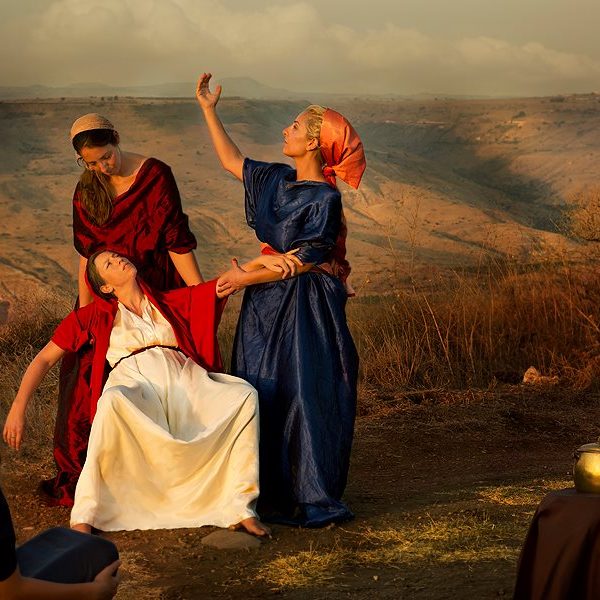Phineas and his brother Hophni were the sons of Eli the High Priest over Israel. They served as priests in the temple but were cursed by God because they were abusing their responsibilities and were engaging in illicit behavior, such as appropriating the best portion of sacrifices for themselves and having sexual relations with the sanctuary’s serving women (1 Samuel 3-4). As a result of their wickedness they were both killed in battle on the same day and the ark of the covenant was captured by the Philistines and carried out of Israel (1 Samuel 4: 10-11). This news caused Eli, who was very old, to fall off his chair and die (1 Samuel 4: 17-18).
Also at this time Eli’s daughter-in-law, Phineas’ wife, was “…near to be delivered: and when she heard the tidings that the ark of God was taken, and that her father in law and her husband were dead, she bowed herself and travailed; for her pains came upon her. And about the time of her death the women that stood by her said unto her, Fear not; for thou hast born a son. But she answered not, neither did she regard it. And she named the child Ichabod, saying, The glory is departed from Israel: because the ark of God was taken, and because of her father in law and her husband. And she said, The glory is departed from Israel: for the ark of God is taken” (1 Samuel 4: 19-22).
This is really one of the saddest birth stories in the the whole scriptures. One can only imagine this poor woman bowed down under her sorrow, her grief, and her heartache trying bravely to cope with the added pain of childbirth. What a hard birth that would have been for her, and for the “women that stood by her”, because she was completely overcome by her grief and refused to be comforted. Even after her travail was over and the women standing by her told her to “fear not” because she had born a beautiful son and had a new reason to live, she still refused to be comforted. In the end she was completely overcome by her physical, emotional and spiritual pain and instead of looking to the future and the hope that lie in it… she chose to die.
I think there are so many important lessons to be learned from this woman’s story, not only for labor and birth but also for life in general. I really loved what Jim Laffoon at “Every Nation” said her learned from this story. He said:
“First, even as the news of her husband’s death began this young woman’s labor pains, so many times God “births” new things out of the most painful moments of our lives. It may be a couple who makes a renewed commitment to their marriage after almost destroying it, or perhaps a child from a Christian family whose newfound passion for God is born out of the pain of backsliding. Time after time, I have watched God bring “life” out of “death.”
Second, the young wife of Phinehas was so overwhelmed by her pain, she lost sight of the hope promised by the birth of a new child. This well may be the most dangerous part of the whole process. When God is birthing something new–in you–out of some crisis or tragedy, your life will either be defined by your pain or your promises. Therefore, it is critical that you hold on to God’s promises in these painful moments.
Third, Phinehas’s wife was so overwhelmed with her pain that she cursed the very child she was bringing to birth. The word Ichabod means “no glory.” As far as she was concerned, the death of Eli and his sons, as well as the capture of the Ark, was the end of the very nation she loved. In reality however, their deaths would usher in the age of Samuel and David, who would lead Israel into her greatest years of glory.
Do you see it yet? Many times when you are in crisis, you feel as if all your hopes and dreams are gone. Like the wife of Phinehas, everything in you simply wants to quit. Some of you have even been tempted to curse the precious new thing God is doing in your life. If this is where you are today, this is no time for you to give into despair.
The great pain you are experiencing is a sign of the even greater promise that will follow it.”
I think that experiencing pain is an important way for us to grow and to learn. Women in childbirth are stretched and pulled to the end of their physical, mental, emotional and spiritual limits but in the end they receive the greatest gift that God can bestow on this earth… new life. The same is true when we allow God to test us and to try us; he stretches and pulls our souls to the ends of their limits and just when we can’t think we can a handle it any more we become reborn… a new creature… stronger, different, and better than before. Pain, whether it is physical, emotional or spiritual, isn’t something to be feared but rather to be embraced as the catalyst for growth and new life. Just like sweetness is enhanced after you’ve tasted something salty, so is joy enhanced after you’ve experienced sorrow. The greater the sorrow and the pain … the greater the pleasure and the joy.
So to all those of you who are facing trials in your life, of the soul or of the body, I want to reiterate what the women who stood next to Phinehas‘ wife told her during her travail, “fear not” because from great pain comes new life… and that is always worth living for.
How has “enduring to the end” and overcoming pain helped transform your life?





Oh I love it. I have nothing to add. I just love it.
Once again Beautiful insight!
I love this story and your insight is beautiful. We all have a choice. We can choose hope and tomorrow, or we can choose death and despair. If we can just endure for awhile through the pain, we will have blessings we never imagined.
Love the insight. Thanks for sharing.
Your post triggered three thoughts that all focused around missionary work in one form or another.
Thought #1:
Alma who had a similar experience to Paul in that he persecuted saints before he proselyted to them, finally came to recognize all the harm he was doing which caused him a lot of pain. He could have considered himself a goner like Phineas' wife; but, he didn't–he remembered Christ's saving power and he recounted:
"O Jesus, thou Son of God, have mercy on me, who am in the gall of bitterness, and am encircled about by the everlasting chains of death.
And now, behold, when I thought this, I could remember my pains no more; yea, I was harrowed up by the memory of my sins no more. And oh, what joy, and what marvelous light I did behold; yea, my soul was filled with joy as exceeding as was my pain!"(Alma 36:18-20)
This made Alma a better missionary, and I can attest it made me a better one too because I can relate to how remembering Christ's atonement turns pain into incredible joy!
Thought 2:
This is a poem I heard during my mission in Venezuela and it has come to mind since then on numerous occasions to keep me going:
DON'T QUIT when the tide is lowest, For it's just about to turn;
DON'T QUIT over doubts and questions, For there's something you may learn.
DON'T QUIT when the night is darkest, For it's just a while 'til dawn;
DON'T QUIT when you've run the farthest, For the race is almost won.
DON'T QUIT when the hill is steepest, For your goal is almost night;
DON'T QUIT, For you're not a failure, until you fail to try.
-Jill Wolf
Thought #3:
I read this scripture this morning about the missionary Aaron and this is what he testified to after being imprisoned, hungered, thirsted, and fatigued by the same people who afterwards opened their hearts up to his message:
"And since man had fallen he could not merit anything of himself; but the sufferings and death of Christ atone for their sins, through faith and repentance, and so forth; and that he breaketh the bands of death, that the grave shall have no victory, and that … (Alma 22:14)
All these thoughts seem to represent the other attitude Phineas' wife could have taken; they all center around Christ; and they make life worth living!
Thanks for the though provoking post. Keep it up!
Wow. Thank you so much for sharing. I truly love reading this blog.